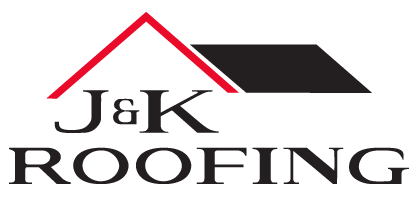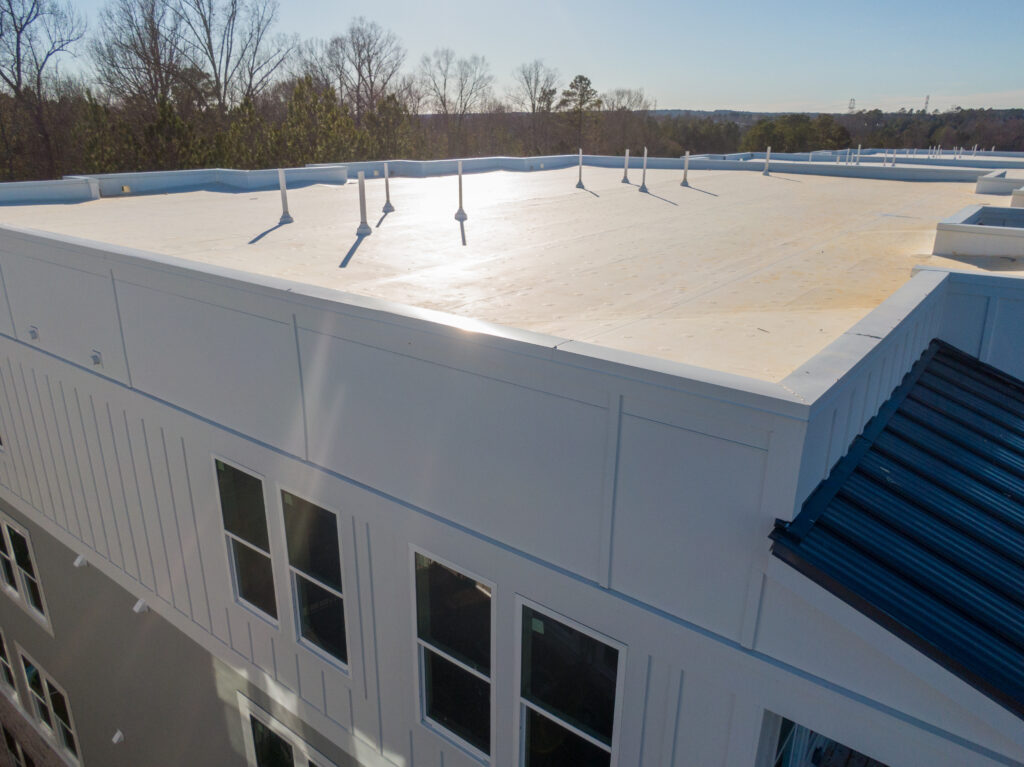Which Commercial Flat Roofing Material Is Right For You?
Selecting the right commercial flat roofing material impacts your building’s durability, energy efficiency, and long-term costs. The heavy snowfall, hailstorms, and high winds that Colorado’s unpredictable weather brings make this decision even more important. The right material protects against damage, improves insulation, and ensures long-term reliability.
A professional contractor plays a key role in this process. Proper installation and routine maintenance prevent costly issues down the road. Whether you’re constructing a new building or replacing an existing roof, working with an experienced local roofer ensures your investment lasts.
Factors to Consider When Choosing Commercial Flat Roofing Material
Climate and Weather Resistance
Colorado’s weather puts commercial flat roofing under stress year-round. High UV exposure during sunny months can degrade certain materials, while sudden temperature swings cause expansion and contraction that lead to cracks and leaks. Prolonged dry spells can also impact roofing materials. Without proper moisture-resistant coatings, some materials may warp or crack. Regular inspections and protective coatings help prevent these issues.
Energy Efficiency
Hot summers and freezing winters make energy-efficient roofing a priority. Reflective materials, such as TPO and PVC, reduce heat absorption, lowering cooling costs in summer. Insulated roofing systems also help retain heat in winter, cutting down on heating expenses. Choosing a roofing material with high solar reflectance can lead to significant long-term savings.
Durability and Longevity
Not all commercial flat roofing materials offer the same lifespan. Some options, such as metal roofing, can last over 50 years with minimal maintenance. Others, like TPO or EPDM, provide solid durability but may require periodic repairs. Consider the expected lifespan of each material and the maintenance it requires.
Cost and Budget
TPO and EPDM roofing systems offer attractive cost benefits for commercial buildings. These materials provide an excellent balance between affordability and performance. While their upfront installation costs are generally lower than traditional options, they still deliver impressive durability and longevity. Both options offer cost-effective solutions that combine initial affordability with ongoing benefits, making them smart choices for budget-conscious building owners looking for reliable roofing systems.
Building Type and Usage
A commercial warehouse has different roofing needs than a restaurant or healthcare facility. Buildings with high foot traffic on the roof may need a more durable material like modified bitumen. Facilities handling chemicals or grease, such as food processing plants, benefit from PVC roofing, which resists chemical damage.
Local Expertise
Hiring a contractor with experience in Colorado’s climate makes a difference. Local roofers understand regional weather challenges and know which materials hold up best over time. They also ensure your project meets local building codes, reducing the risk of compliance issues. Regular maintenance is another important factor. Some warranties require routine inspections to remain valid, making scheduled checkups a cost-effective way to extend the life of your roof.
Most Popular Commercial Flat Roofing Materials

TPO (Thermoplastic Polyolefin)
TPO roofing is one of the most popular choices for commercial buildings. It’s affordable, energy-efficient, and reflects sunlight to reduce cooling costs. However, TPO is prone to punctures, so it may not be ideal for roofs with frequent foot traffic.
- UV-resistant and energy-efficient, reducing cooling costs
- Lower installation cost and ease of installation compared to some materials
- Requires careful installation to prevent seam failures
- Both black and white color options are available as Colorado has an equal number of heating days and cooling days
EPDM (Ethylene Propylene Diene Monomer)
EPDM is a synthetic rubber membrane known for its flexibility and durability. It handles extreme temperatures well, making it a great option for Colorado’s fluctuating climate. While it lasts for decades, it isn’t as reflective as TPO or PVC, meaning it absorbs more heat.
- Excellent durability and resistance to extreme weather
- Lower cost than PVC but less energy-efficient
- Minimal maintenance
- Requires additional coatings for improved reflectivity
- Both black and white options are available
PVC (Polyvinyl Chloride)
PVC roofing offers superior chemical resistance and energy efficiency. Its white surface reflects heat, making it a smart choice for businesses focused on reducing energy costs. However, prolonged UV exposure may cause the material to degrade over time.
- High solar reflectance lowers cooling costs
- Strong resistance to grease, chemicals, and fire
- Higher upfront cost compared to TPO and EPDM
Built-Up Roofing (BUR)
While Built-Up Roofing BUR has been a popular choice for commercial flat roofing, modern roofing solutions like EPDM and TPO offer significant advantages. BUR systems consist of multiple layers of asphalt and felt, providing durability and waterproofing capabilities. However, this roofing system comes with drawbacks such as heavy weight, requires a torch-down method installation, and potential environmental concerns. For building owners looking to upgrade from BUR or choose a new roofing system, EPDM and TPO deserve serious consideration for their numerous benefits and adaptability to various commercial roofing needs.
- Downside of torch-down installation
- Durability and waterproofing properties
- Heavier weight requires structural reinforcement in some cases
Modified Bitumen
This asphalt-based roofing material is reinforced for added durability. Modified bitumen is easy to repair and holds up well under heavy foot traffic, making it ideal for rooftops with frequent access.
- Excellent durability for high-traffic areas
- Affordable compared to BUR and metal roofing
- Requires regular inspections to maintain performance
Metal Roofing
Metal roofs last longer than most flat roofing materials. They resist extreme weather, including hail and strong winds, and require little maintenance. The higher installation cost is offset by longevity and durability.
- Superior lifespan of 40–50 years or more
- Fire-resistant and highly durable
- Higher initial cost but lower long-term maintenance
What To Consider for Colorado Flat Roofs
- Hail and UV Protection: Colorado’s frequent hailstorms make impact-resistant materials essential. Reflective coatings enhance durability and improve energy efficiency. Many businesses opt for reinforced membranes or coatings to extend their roof’s lifespan.
- Local Contractors and Compliance: Working with established Colorado-based roofing companies ensures your project meets local regulations. Contractors like J&K Roofing specialize in commercial flat roofing and understand the region’s weather-related challenges.
- Warranty and Maintenance Plans: Many manufacturers offer warranties, but some require regular maintenance to stay valid. A professional contractor will help you navigate warranty options and develop a maintenance plan that protects your investment.
Get Expert Advice for Your Commercial Flat Roofing Project from J&K Roofing
Choosing the right commercial flat roofing system involves balancing durability, energy efficiency, and budget. With Colorado’s extreme weather, selecting the best material can mean the difference between years of reliable performance and costly repairs. J&K Roofing specializes in commercial roofing solutions tailored to the unique challenges of the region. Contact us today for a free consultation and let our experts help you make the best decision for your building.

